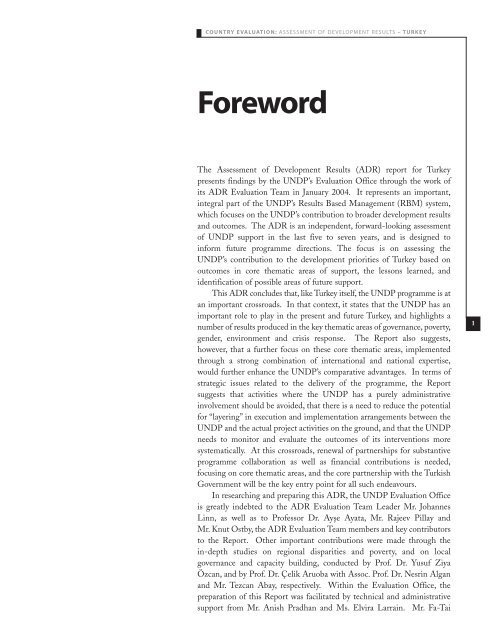Reports - United Nations Development Programme
Reports - United Nations Development Programme
Reports - United Nations Development Programme
You also want an ePaper? Increase the reach of your titles
YUMPU automatically turns print PDFs into web optimized ePapers that Google loves.
COUNTRY EVALUATION: ASSESSMENT OF DEVELOPMENT RESULTS – TURKEY<br />
Foreword<br />
The Assessment of <strong>Development</strong> Results (ADR) report for Turkey<br />
presents findings by the UNDP’s Evaluation Office through the work of<br />
its ADR Evaluation Team in January 2004. It represents an important,<br />
integral part of the UNDP’s Results Based Management (RBM) system,<br />
which focuses on the UNDP’s contribution to broader development results<br />
and outcomes. The ADR is an independent, forward-looking assessment<br />
of UNDP support in the last five to seven years, and is designed to<br />
inform future programme directions. The focus is on assessing the<br />
UNDP’s contribution to the development priorities of Turkey based on<br />
outcomes in core thematic areas of support, the lessons learned, and<br />
identification of possible areas of future support.<br />
This ADR concludes that, like Turkey itself, the UNDP programme is at<br />
an important crossroads. In that context, it states that the UNDP has an<br />
important role to play in the present and future Turkey, and highlights a<br />
number of results produced in the key thematic areas of governance, poverty,<br />
gender, environment and crisis response. The Report also suggests,<br />
however, that a further focus on these core thematic areas, implemented<br />
through a strong combination of international and national expertise,<br />
would further enhance the UNDP’s comparative advantages. In terms of<br />
strategic issues related to the delivery of the programme, the Report<br />
suggests that activities where the UNDP has a purely administrative<br />
involvement should be avoided, that there is a need to reduce the potential<br />
for “layering” in execution and implementation arrangements between the<br />
UNDP and the actual project activities on the ground, and that the UNDP<br />
needs to monitor and evaluate the outcomes of its interventions more<br />
systematically. At this crossroads, renewal of partnerships for substantive<br />
programme collaboration as well as financial contributions is needed,<br />
focusing on core thematic areas, and the core partnership with the Turkish<br />
Government will be the key entry point for all such endeavours.<br />
In researching and preparing this ADR, the UNDP Evaluation Office<br />
is greatly indebted to the ADR Evaluation Team Leader Mr. Johannes<br />
Linn, as well as to Professor Dr. Ayşe Ayata, Mr. Rajeev Pillay and<br />
Mr. Knut Ostby, the ADR Evaluation Team members and key contributors<br />
to the Report. Other important contributions were made through the<br />
in-depth studies on regional disparities and poverty, and on local<br />
governance and capacity building, conducted by Prof. Dr. Yusuf Ziya<br />
Özcan, and by Prof. Dr. Çelik Aruoba with Assoc. Prof. Dr. Nesrin Algan<br />
and Mr. Tezcan Abay, respectively. Within the Evaluation Office, the<br />
preparation of this Report was facilitated by technical and administrative<br />
support from Mr. Anish Pradhan and Ms. Elvira Larrain. Mr. Fa-Tai<br />
1

















